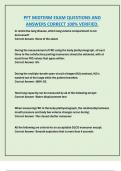Measurement of frc - Study guides, Class notes & Summaries
Looking for the best study guides, study notes and summaries about Measurement of frc? On this page you'll find 138 study documents about Measurement of frc.
Page 2 out of 138 results
Sort by
![NBRC REVIEW – PFTS EXAM REVIEW QUESTIONS AND ANSWERS, RATED A+/ VERIFIED/[LATEST EXAM UPDATES]](/docpics/5367612/664af753cc701_5367612_121_171.jpeg)
-
NBRC REVIEW – PFTS EXAM REVIEW QUESTIONS AND ANSWERS, RATED A+/ VERIFIED/[LATEST EXAM UPDATES]
- Exam (elaborations) • 8 pages • 2024
- Available in package deal
-
- $8.49
- + learn more
NBRC REVIEW – PFTS EXAM REVIEW QUESTIONS AND ANSWERS, RATED A+/ VERIFIED/ spirometers - used to measure *volume* and *flow rates* pneumotachometers - - *turbine device:* measures flow, and may display volume - *pressure differential (Fleisch) pneumotachometer:* measures flow; can be used to continuously measure minute ventilation peak flow meters - - device used to measure PEFR at bedside - accuracy affected by patient effort - moisture and debris can affect accuracy finding persona...
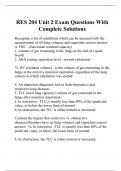
-
RES 204 Unit 2 Exam Questions With Complete Solutions.
- Exam (elaborations) • 17 pages • 2023
- Available in package deal
-
- $12.99
- + learn more
Recognize a list of conditions which can be assessed with the measurement of all lung volumes and capacities correct answer: A. FRC - (functional residual capacity) 1. volume of gas remaining in the lungs at the end of a quiet breath 2. AKA resting expiration level - normal exhalation. *3. RV (residual volume) - is the volume of gas remaining in the lungs at the end of a maximal expiration, regardless of the lung volume at which exhalation was started 4. An important diagnostic tool in ...
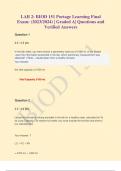
-
LAB 2: BIOD 151 Portage Learning Final Exam: (2023/2024) | Graded A| Questions and Verified Answers
- Exam (elaborations) • 16 pages • 2023
- Available in package deal
-
- $9.49
- + learn more
LAB 2: BIOD 151 Portage Learning Final Exam: (2023/2024) | Graded A| Questions and Verified Answers Question 1 2.5 / 2.5 pts In the lab video, you were shown a spirometry read out of 3100 ml. of air. Based upon the information presented in the lab, which pulmonary measurement was obtained? (*Note – results taken from a healthy female.) Your Answer: the vital capacity of 3100 ml. Vital Capacity 3100 ml. Question 2 2.5 / 2.5 pts Us...
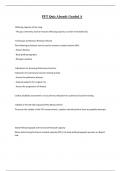
-
PFT Quiz Already Graded A
- Exam (elaborations) • 6 pages • 2024
- Available in package deal
-
- $10.29
- + learn more
PFT Quiz Already Graded A Diffusing Capacity of the Lung - The gas commonly used to measure diffusing capacity is carbon monoxide (CO). Techniques to Measure Residual Volume The following techniques can be used to measure residual volume (RV): - Helium dilution - Body plethysmography - Nitrogen washout Indications for Assessing Pulmonary Function Indications for pulmonary function testing include: - Screen for pulmonary disease - Evaluate patients for surgical risk - Assess the progres...
PFT MIDTERM EXAM QUESTIONS AND ANSWERS CORRECT 100% VERIFIED.

-
PREPARING FOR SAE QUESTIONS AND ANSWERS WITH SOLUTIONS 2025
- Exam (elaborations) • 6 pages • 2024
- Available in package deal
-
- $13.39
- + learn more
Evalutation of maximum expiratory pressure is most useful in which of the following? a. fixed upper airway obstruction b. presence of restricive defect c. inspiratory muscle strngth d. forcefulness of cough - ANSWER d. forcefulness of cough Explanation: MEP is used to measure the forcefulness of a patients cough and used to determine if the patient is able to sustain ventilation. A bronchoscopy is used to diagnose a. atelectasis b. idiopathic chronic bronchitis c. malignant proces...
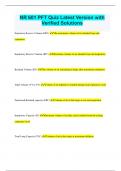
-
NR 601 PFT Quiz Latest Version with Verified Solutions
- Exam (elaborations) • 4 pages • 2024
- Available in package deal
-
- $8.99
- + learn more
NR 601 PFT Quiz Latest Version with Verified Solutions Expiratory Reserve Volume (ERV) The maximum volume of air exhaled from end expiration. Inspiratory Reserve Volume (IRV) Maximum volume of air inhaled from end inspiration Residual Volume (RV) The volume of air remaining in lungs after maximum exhalation. Tidal Volume (VT or TV) Volume of air inhaled or exhaled during each respiratory cycle Functional Residual capacity (FRC) Volume of air in the lungs at rest end expiration Inspiratory C...
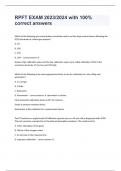
-
RPFT EXAM 2023/2024 with 100% correct answers
- Exam (elaborations) • 4 pages • 2023
-
- $16.49
- + learn more
Which of the following gas concentrations should be used to set the slope control when calibrating the PCO2 electrode of a blood gas analyzer? A. 5% B. 10% C. 15% D. 20% - correct answer B. SLope is high calbiration value and the low calibraiton value is just called calibration. PCO2 is the severnhas electrode. 5% for low and 10% high Which of the following is the most appropriate device to use for calibration of a dry rolling seal spirometer? A. 3 L syringe B. U tube C. Rotameter...
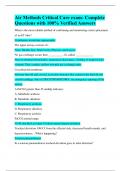
-
Air Methods Critical Care exam- Complete Questions with 100% Verified Answers
- Exam (elaborations) • 34 pages • 2023
- Available in package deal
-
- $14.49
- + learn more
Air Methods Critical Care exam- Complete Questions with 100% Verified Answers What is the most reliable method of confirming and montioring correct placement of an ET tube? Continuous waveform capnography The upper airway consists of... Nose, Mouth, Jaw, Oral Cavity, Pharynx, and Larynx No gas exchange occurs here __________, it's called ____________. Nose to terminal bronchioles, anatomical dead space. (2ml/kg of inspired tidal volume) They conduct airflow towards gas exchange units....
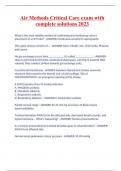
-
Air Methods Critical Care exam with complete solutions 2023
- Exam (elaborations) • 26 pages • 2023
- Available in package deal
-
- $12.99
- + learn more
Air Methods Critical Care exam with complete solutions 2023 What is the most reliable method of confirming and montioring correct placement of an ET tube? - Answer- Continuous waveform capnography The upper airway consists of... - Answer- Nose, Mouth, Jaw, Oral Cavity, Pharynx, and Larynx No gas exchange occurs here __________, it's called ____________. - Answer- Nose to terminal bronchioles, anatomical dead space. (2ml/kg of inspired tidal volume) They conduct airflow towards gas exchange uni...

How did he do that? By selling his study resources on Stuvia. Try it yourself! Discover all about earning on Stuvia

